
Juan Luis Guerra Seijas is a Dominican musician, singer, composer, and record producer. Throughout his career, he has won numerous awards including 28 Latin Grammy Awards, three Grammy Awards, and one Latin Billboard Music Award. He won 3 Latin Grammy Awards in 2010, including Album of the Year. In 2012, he won the Latin Grammy Award for Producer of the Year. He has sold 15 million records worldwide, making him one of the best-selling Latin music artists.

Mudanza y Acarreo is the second album by songwriter and musician Juan Luis Guerra. The album is widely known for making Guerra and 440 famous, and launching to national fame the group within their native Dominican Republic. It was the first album recorded with Mariadalia Herandez as a member of the band. With this record, the group got radio airplay for the first time with songs like "Elena" and "Por eso Ahora" in the Dominican Republic. "Si tu te vas" is considered their first hit and was included in the Greatest Hits compilation Grandes Éxitos Juan Luis Guerra y 440 (1995) as bonus track.

Para Ti is the ninth studio album by singer-songwriter Juan Luis Guerra and his band 4.40. It was released on August 31, 2004, by Vene Music and distributed by Universal Latin Music. It was his first studio album in six years since Ni es lo mismo ni es igual (1998) and is his first Christian-gospel inspired album. The lyrics are inspired by his conversion to Christianity and his experience of being a born again Christian. The album explores music genres from gospel and ballads to the salsa and merengue. The album was supported by the release of three official singles: "Para Ti", "Las Avispas" and "Dinteles".

Ni Es lo Mismo Ni Es Igual is the eighth studio album recorded by Dominican singer-songwriter Juan Luis Guerra and his band 4.40. It was released by Karen Records on 15 December 1998 and distributed by PolyGram Latino. It was Guerra's comeback album after four years of silence, out of the public eye and since his conversion to Christianity. It was his first studio album since Fogarate (1994). The album production and songwriting were done by Guerra. The album was supported by the release of four official singles: "Mi PC", "Palomita Blanca", "El Niagara en Bicicleta" and "La Hormiguita". Two singles were released as promotional singles: "Vale La Pena" and "Quisiera".

Bachata Rosa is the fifth studio album by Dominican singer-songwriter Juan Luis Guerra and his group 4.40. It was released on 11 December 1990, by Karen Records. It brought bachata music into the mainstream in the Dominican Republic and gave the genre an international audience. A Portuguese version of the record was released in 1992 under the title Romance Rosa; it was certified gold in Brazil. The album received a Grammy Award for Best Tropical Latin Album and two Lo Nuestro Awards for Tropical Album of the Year and Tropical Group of the Year.
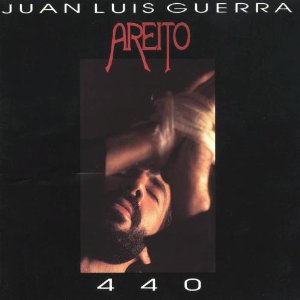
Areíto is the sixth album by Juan Luis Guerra with his band 440, released on 8 December 1992, by Karem Records. The album, meant to be a tribute to the indigenous tribes of the Dominican Republic, is named after a dance that the aboriginal inhabitants of the Greater Antilles (Taínos) accompanied with songs during their festivals and religious rites. The album contains twelve tracks including "Cuando te Beso", interpret by Santo Domingo Philharmonic Orchestra. Congolese musician Diblo Dibala played guitar on the song "El Costo de la Vida", which was a Spanish cover of his own soukous song "Kimia Eve", while the last track on the album, "Naboria daca, mayanimacaná", is sung in Arawak, the language of the Taíno people. Areíto was originally set to be released in early April 1992, but was first delayed to the end of October 1992 and was finally released on 8 December 1992.

A Son de Guerra, sometimes referred to as Asondeguerra, is the 11th studio album recorded by Dominican singer-songwriter Juan Luis Guerra, It was released by Capitol Latin on June 8, 2010. The album contains 11 tracks, and its musical structure and production are based on Merengue, Bachata, Son, Salsa, experimenting and incorporating elements of jazz, blues, funk, cumbia, rock, reggae, rap, and mambo. Lyrical themes on the album include protest against political corruption, immigration, love and romance. Featured appearances include Juanes and Chris Botti. For many fans and critics alike, it's his album with the most social content and strong social criticism since his 1992's Areito.

"Mi PC" is a song by Dominican Republic singer-songwriter Juan Luis Guerra and his band 4-40 from his eighth studio album, Ni Es lo Mismo Ni Es Igual (1998). The song was released as the lead single from the album in November 1998 by Karen Records. The song was written and produced by Guerra. It is a pop merengue track in which Guerra uses computer terminology to narrate a love story. "Mi PC" was met with positive reactions from music critics who found the lyrics to be clever and its music catchy.
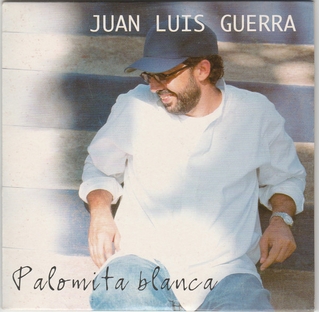
"Palomita Blanca" is a song by Dominican Republic singer-songwriter Juan Luis Guerra and his band 4-40 from his eighth studio album, Ni Es lo Mismo Ni Es Igual (1998). As with the rest of the album, the song was written and produced by Guerra. The song was released as the second single from the album in March 1999 by Karen Records. It is a bachata acoustic ballad about a man who is immensely in love with a woman and refuses to let her go.

"El Niágara en Bicicleta" is a song by Dominican Republic singer-songwriter Juan Luis Guerra and his band 4-40 from his eighth studio album, Ni Es lo Mismo Ni Es Igual (1998). The song was written and produced by Guerra. It was released as the third single from the album in 1999 by Karen Records. A merengue rap song, it sees the protagonist finding himself in a hospital that is in poor condition, based on Guerra's experience in one. The song received positive reactions from three music critics, who praised who praised its music and socially conscious lyrics.

Grandes Éxitos de Juan Luis Guerra y 440 or simply Grandes Éxitos is a compilation album of Dominican singer-songwriter Juan Luis Guerra, and his band 440 released in July 1995 by Karem Records. It contained Guerra's fifteen biggest hits from 1988 to 1994 on the original version and from the albums Mudanza y Acarreo(1985) to Fogarate! (1994) on the international versions. The compilation receive positive reviews by the critics.

Colección Romántica is a compilation album by Dominican songwriter and musician Juan Luis Guerra and 4.40. It was released in November 21, 2000 and February 6, 2001 in the United States by Karen Records.It is a dual album compilation including 20 of the group's classic songs remastered and re-recorded as ballads. The album also contained unaltered original versions of their softer songs, like acoustic ballads or bachatas. It would become Guerra's last album released under the Dominican independent music label Karen Records, as his later albums would be released under Vene Music and subsequently under EMI music and Capitol Latin.

Todo Tiene Su Hora is the 13th studio album by Dominican singer-songwriter Juan Luis Guerra and his band 4.40. It was released on November 11, 2014, by Capitol Latin and was produced by Juan Luis Guerra & Janina Rosado. Like his previous albums, the album is composed by variety of tropical music genres such as bachata, merengue, salsa and son but with different instrumentation normally used in classical music such as strings and violins. Guerra described the album as "innovative" and explored lyrics raging from love and romance to social conscience and protest against political corruption. The record encompassed elements of funk and jazz with merengue and classical music with bachata.
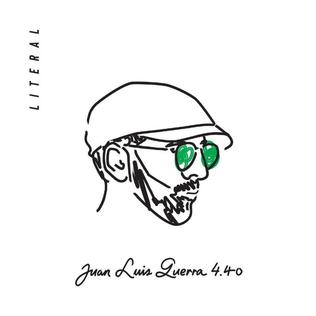
Literal is the 14th studio album by Dominican singer, songwriter and producer Juan Luis Guerra. It was released on 31 May 2019 by Universal Music Latin. Written and produced by Juan Luis Guerra, the album contains eleven tracks and encompasses a variety of tropical genres, such as bachata, merengue, salsa and son along with influences from jazz, gospel, rock and Dominican folk music. The album was co-produced by Guerra's longtime collaboration and musical director Janina Rosado. It has lyrics about romance, love, nostalgia, moving on and protest against corruption.
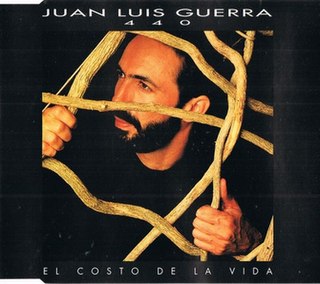
"El Costo de la Vida" is a song by Dominican Republic singer-songwriter Juan Luis Guerra from his sixth studio album, Areíto (1992). The song was released as the album's third single in 1992 by Karen Records. It is a Spanish-language adaptation of soukous song "Kimia Eve" composed by Diblo Dibala. The song features Dibala on the guitar and is performed by Guerra as a merengue number. The lyrics to the song provides a social commentary to the rising cost of living, while Guerra denounces the dislevel of socioeconomics as well as political corruptions in Latin America. Guerra also references the racial identities of Latin America.

Entre Mar y Palmeras is the second live album of the Dominican artist Juan Luis Guerra and 4.40. It was released on June 18, 2022 along with special concert, an open-air and audience-free concert, broadcast by HBO special, premiere on June 3, 2021, performing the songs and was recorded at the Esmeralda Beach, Miches in the Dominican Republic. It contains 16 live versions of hits and was directed by Guerra's oldest son, Jean Guerra. The album won Best Long Form Music Video at the 22nd Annual Latin Grammy Awards and Best Merengue/Bachata Album at the 23rd Annual Latin Grammy Awards. Also, it was nominated for Album of the year at the 2022 Lo Nuestro Awards.

"Como Abeja Al Panal" is a song by Dominican Republic singer-songwriter Juan Luis Guerra released in 1990 and served as the lead single from his fifth studio album Bachata Rosa (1990). It is a song that tells the story of a forbidden love.
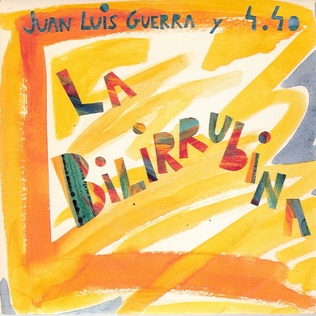
"La Bilirrubina" is a song by Dominican singer-songwriter Juan Luis Guerra. It was written by Guerra and released by Karem Records on 1990 and 1991 in Europe as the second single from his fifth studio album, Bachata Rosa. It was nominated for Record of the Year at 1991 Lo Nuestro Awards. The merengue track is considered one of Guerra's signature songs and most popular. It receive positive reviews and was listed one of the best tracks of the album.
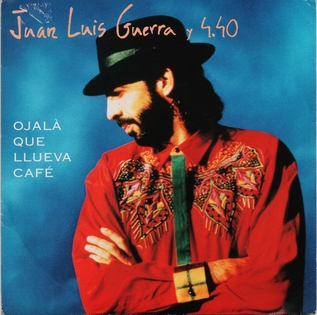
"Ojalá Que Llueva Café" is the lead single by the Dominican artist Juan Luis Guerra and his band 4:40 from their fourth studio album of the same title. It was released on 1989 by Karen Records and 1990 in Europe by Ariola Records. The lyrics are a poetic metaphor about the poor conditions of the hard-working people residing in the countryside and the hope that the things are going be better someday in the future. It is one of Guerra’s signature songs and one of the first tracks to gain international attention in his career, peaking on the Billboard Hot Latin Tracks and Latin America airplay charts. The music video was ranked number one of the top 15 best music videos of all time by Dominican artists.

"Bachata Rosa" is a song by Dominican Republic singer-songwriter Juan Luis Guerra released in 1991 and served as the lead seventh and final from his fifth studio album Bachata Rosa (1990). Along with Estrellitas y Duendes and Como Abeja Al Panal, is one of Guerra's first international hits and helped to contribute to the bachata sophistication and have recognition in Latin America and Europe. The track was a commercial success, toping the airplay charts in Mexico and was the fourth single of the album to peak insade of the top 10 at the US Hot Latin Tracks.















